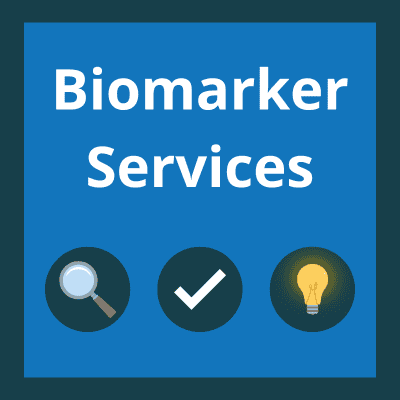Biomarker Services: Discovery, Validation & More
- 3rd November 2025
- Posted by: Breige McBride
- Category: Biomarkers

We provide the following biomarker research services to pharmaceutical and biotech companies, CROs and academia:
- Biomarker Discovery
- Biomarker Signature Identification
- Biomarker Validation
- Biomarker Stratification
The majority of our clients use these services to support clinical trials, drug discovery and development. You can learn more about each of the biomarker services we offer, and their applications, below.
Biomarker Discovery
This is one of our key biomarker services at Fios Genomics as we regularly turn complex biological data into actionable insights for biomarker discovery. Our advanced analytical workflows uncover gene signatures, pathway activity, immune infiltration patterns, tumour evolution and more, to help you understand the mechanisms driving disease. By combining public and proprietary datasets from patients, preclinical models, and biobanks, we generate biomarker hypotheses with strong biological relevance. We also design biomarker panels ready for clinical use, enabling more accurate response prediction and deeper mechanistic insight.
Our expertise spans genomics, transcriptomics, proteomics, and metabolomics, allowing us to identify genes, proteins, or metabolites that reliably correlate with disease status or treatment outcomes. With our support, your biomarker programs can move faster and smarter.
Biomarker Signature Identification
After identifying biomarker candidates we integrate them with clinical and phenotypic data to highlight the signatures that are most likely to be biologically meaningful.
Biomarker Validation
Biomarker validation is essential to ensure a biomarker will work for its intended use and provide consistent and reliable results. At Fios Genomics, we apply bioinformatics analyses across multiple data types and integrate these with clinical and phenotype data to test if candidate biomarkers are consistent, reproducible and correlate with outcomes. We examine the underlying biological data, such as gene expression or protein profiles, in order to understand things like which pathways or patient subgroups are involved. This enables us to confirm that a biomarker is biologically relevant rather than just statistically significant.
Biomarker Stratification
Biomarker stratification is the process of using biological markers to group patients into subgroups based on their characteristics, disease progression, or predicted response to a specific treatment. This allows for the development of more personalised and effective treatments, since therapies can be tailored to specific patient populations. In turn, this leads to more efficient clinical trials and better patient outcomes. What’s more, biomarker stratification can prevent use of the therapies in populations that might develop severe side effects, helping to avoid this from leading to overall clinical trial failure.
Published Projects
We never ask for acknowledgement in client publications, but often our clients are so pleased with the results of our biomarker services that they choose to acknowledge us. You can see some publications featuring biomarker projects we worked on, below:
Some of Our Previous Biomarker Projects include:
- Identifying immune, genetic and transcriptional biomarkers associated with differential response to treatment
- Identifying tumour fusion burden may be a more appropriate biomarker than tumor mutational burden in prostate cancer
- Identifying baseline plasma biomarkers associated with survival in previously treated advanced hepatocellular carcinoma
How Clients Use Our Biomarker Services
Our biomarker solutions help with everything from accelerating drug development research to informing clinical decision-making. We help researchers uncover how drugs work, predict patient responses and identify new therapeutic opportunities.
We assist with:
Translating preclinical findings into clinical biomarker hypotheses, by comparing animal model outputs with human response datasets.
Uncovering prognostic biomarkers, that help researchers stratify patients to predict their likely response to a drug (e.g responders vs non-responders). We can also build robust responder/non-responder classification models for precision trial design.
Determining Drug Efficacy and Mechanism of Action, by identifying biomarkers that can be used to measure a drug’s effectiveness and provide insight into how the drug works at a molecular level.
Drug Target and Lead Identification, by discovering and validating biomarkers that indicate potential drug targets or therapeutic pathways. These biomarkers help guide drug discovery, optimise lead selection, and provide molecular insights that support both preclinical and clinical decision-making.
Need help with your biomarker research?
We’ve supported biomarker studies for over 15 years, helping researchers turn complex data into actionable insights. Have a question or want a project quote? Fill out the form below, and our experts will get back to you quickly with guidance tailored to your study.
Author: Breige McBride, Marketing Manager, Fios Genomics
Reviewed by Fios Genomics Bioinformatics Experts to ensure accuracy
See Also:
Supporting Biomarker Discovery with Bioinformatics
Identifying Biomarkers Associated With Gene Dependency
Examples of Biomarkers and Biomarker Data Analysis
Biomarker Validation: Avoiding Misleading Results

